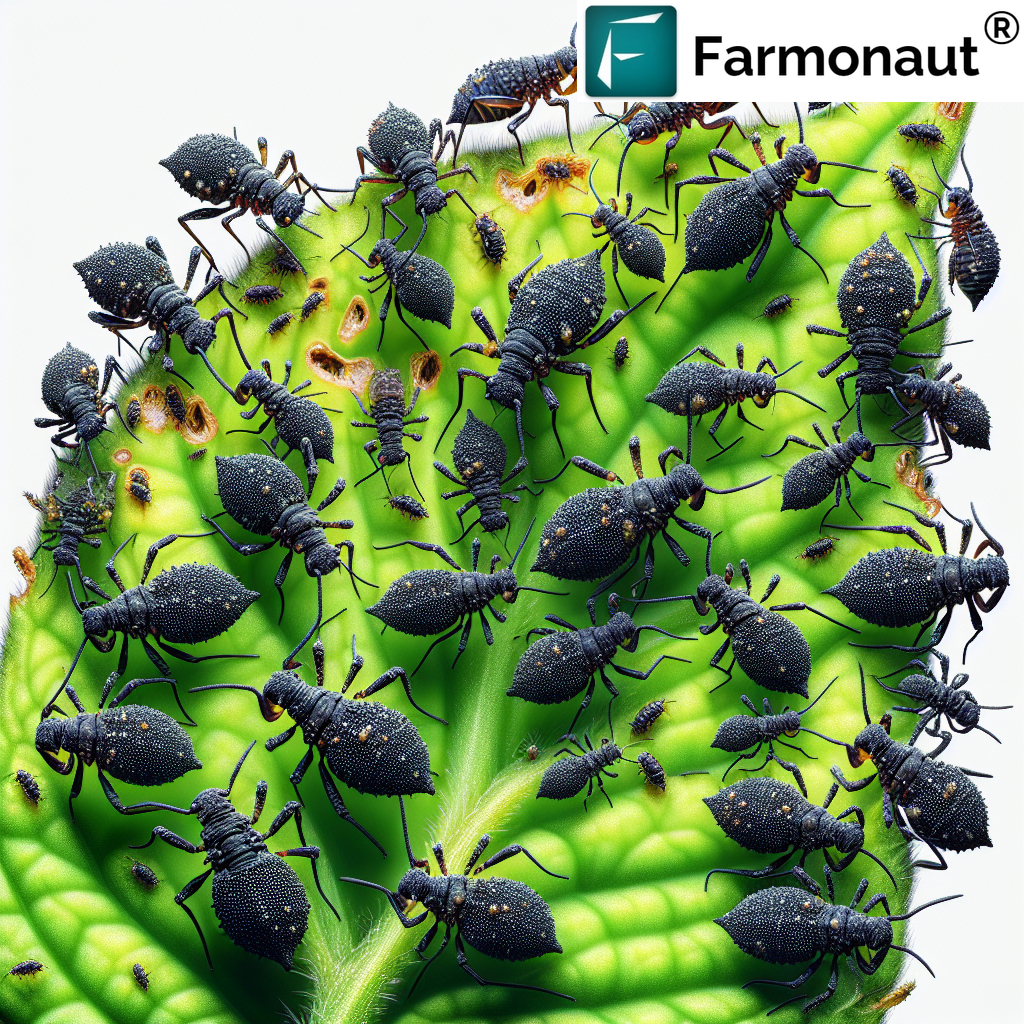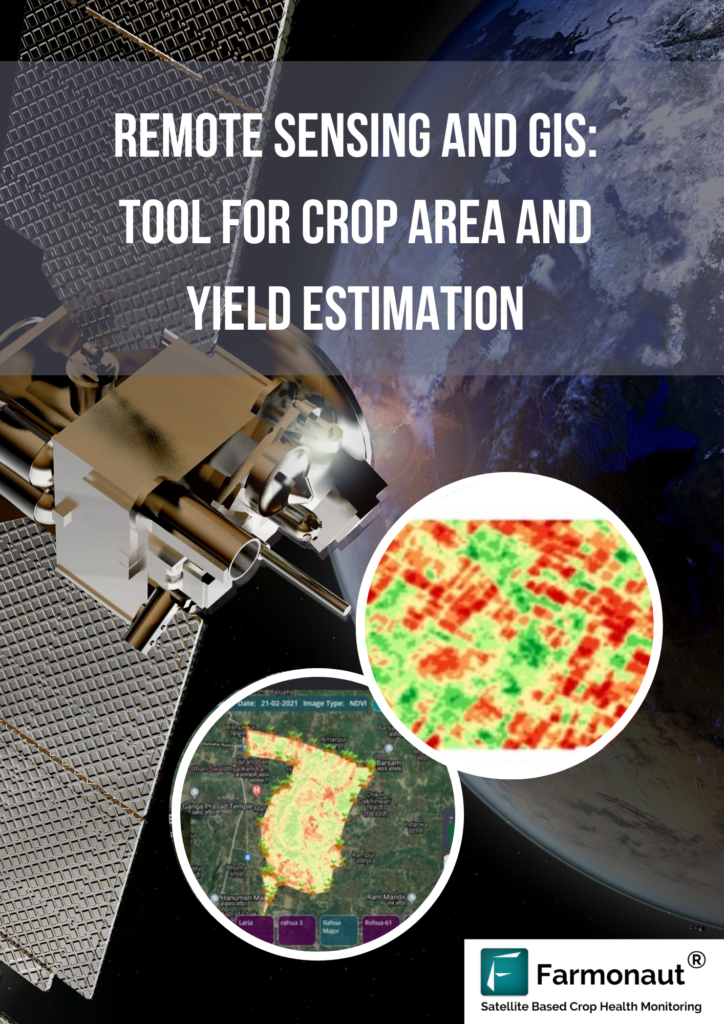The Ultimate Guide to Combating Black Aphids: Identification, Treatment, and Prevention

As agricultural technology experts at Farmonaut, we understand the challenges farmers and gardeners face when dealing with pests. One of the most persistent and troublesome pests in both indoor and outdoor settings is the black aphid. In this comprehensive guide, we’ll explore everything you need to know about black aphids on plants, including identification, treatment options, and prevention strategies.
Table of Contents
- Understanding Black Aphids
- Identifying Black Aphids on Plants
- The Impact of Black Aphids on Plant Health
- Treatment Options for Black Aphids
- Preventing Black Aphid Infestations
- Black Aphids on Indoor Plants
- Natural Predators of Black Aphids
- How Farmonaut’s Technology Aids in Pest Management
- Frequently Asked Questions
1. Understanding Black Aphids
Black aphids, scientifically known as Aphis fabae, are small, sap-sucking insects that belong to the family Aphididae. These pests are a common problem for many plants, both indoors and outdoors. While they’re called “black” aphids, their color can range from dark brown to black, and some species may have a slight greenish tint.
Key Characteristics of Black Aphids:
- Size: Typically 1-2 mm long
- Body shape: Pear-shaped with long antennae
- Reproduction: Can reproduce rapidly, both sexually and asexually
- Preferred plants: Wide range, including vegetables, fruits, and ornamental plants
- Damage caused: Stunted growth, leaf distortion, and transmission of plant viruses
2. Identifying Black Aphids on Plants
Recognizing black aphids on plants is crucial for early intervention and effective treatment. Here are some signs to look out for:
- Clusters of small, black insects on leaves, stems, and buds
- Sticky residue on leaves or nearby surfaces (honeydew secreted by aphids)
- Curled, distorted, or yellowing leaves
- Stunted plant growth
- Presence of sooty mold (a fungus that grows on honeydew)

At Farmonaut, our satellite-based crop health monitoring system can detect early signs of pest infestations, including black aphids. By analyzing multispectral imagery, we can identify areas of stress in your crops before visible symptoms appear, allowing for prompt intervention.
3. The Impact of Black Aphids on Plant Health
Black aphids can have a significant negative impact on plant health and crop yields. Understanding their effects is crucial for implementing effective control measures:
Direct Damage:
- Sap depletion: Aphids feed on plant sap, depriving the plant of essential nutrients
- Leaf distortion: Feeding can cause leaves to curl, twist, or become misshapen
- Stunted growth: Severe infestations can lead to reduced plant growth and vigor
- Reduced yield: In agricultural settings, black aphid infestations can significantly decrease crop yields
Indirect Damage:
- Honeydew production: Aphids excrete a sticky substance called honeydew, which can attract other pests and promote fungal growth
- Sooty mold: The honeydew serves as a substrate for sooty mold, which can block sunlight and reduce photosynthesis
- Virus transmission: Black aphids can act as vectors for various plant viruses, spreading diseases between plants
Our Farmonaut platform utilizes advanced satellite imagery and AI algorithms to detect early signs of crop stress caused by pests like black aphids. By monitoring vegetation health indices such as NDVI (Normalized Difference Vegetation Index), we can alert farmers to potential infestations before they become severe.
4. Treatment Options for Black Aphids
When it comes to black aphids on plants treatment, there are several effective options available. The choice of treatment depends on the severity of the infestation, the type of plants affected, and whether you prefer organic or chemical methods.
4.1 Natural and Organic Treatments
- Water spray: A strong jet of water can dislodge aphids from plants. Repeat this process every few days for best results.
- Neem oil: This natural insecticide disrupts the feeding and reproductive cycles of aphids. Mix according to package instructions and spray on affected plants.
- Insecticidal soaps: These products are effective against soft-bodied insects like aphids. Ensure complete coverage of the plant, including the undersides of leaves.
- Diatomaceous earth: Sprinkle this natural powder around the base of plants to create a barrier against crawling insects.
- Essential oils: Peppermint, rosemary, and thyme oils can repel aphids. Mix a few drops with water and spray on plants.
4.2 Chemical Treatments
For severe infestations or when natural methods prove ineffective, chemical insecticides may be necessary. Always follow the manufacturer’s instructions and consider the potential impact on beneficial insects.
- Pyrethrins: Derived from chrysanthemum flowers, these insecticides are effective against a wide range of pests, including aphids.
- Imidacloprid: A systemic insecticide that can provide long-lasting protection against aphids.
- Malathion: An organophosphate insecticide effective against many garden pests, including aphids.
At Farmonaut, we recommend starting with natural treatments whenever possible to minimize environmental impact. Our AI-powered advisory system, Jeevn AI, can provide personalized recommendations for pest management based on your specific crop and environmental conditions.
5. Preventing Black Aphid Infestations
Prevention is always better than cure when it comes to pest management. Here are some strategies to help prevent black aphid infestations:
- Companion planting: Grow plants that repel aphids, such as marigolds, nasturtiums, and alliums, near susceptible crops.
- Crop rotation: Regularly rotating crops can disrupt the life cycle of pests and reduce the likelihood of infestations.
- Proper plant spacing: Adequate spacing between plants improves air circulation and makes it harder for pests to spread.
- Regular inspections: Routinely check your plants for signs of aphids or other pests.
- Encourage natural predators: Create a garden environment that attracts beneficial insects like ladybugs and lacewings, which feed on aphids.
- Prune and dispose of infected parts: Remove heavily infested plant parts and dispose of them properly to prevent the spread of aphids.
Farmonaut’s satellite-based monitoring system can help detect early signs of stress in your crops, allowing for proactive pest management. By identifying potential problem areas before they become severe, you can implement preventive measures more effectively.
6. Black Aphids on Indoor Plants
Black aphids on indoor plants can be particularly challenging to manage due to the controlled environment and lack of natural predators. Here are some specific tips for dealing with aphids on houseplants:
- Isolate affected plants: Immediately separate infested plants from healthy ones to prevent the spread of aphids.
- Prune and clean: Remove heavily infested leaves or stems and clean the remaining plant thoroughly.
- Use sticky traps: Yellow sticky traps can help capture adult aphids and monitor infestation levels.
- Increase humidity: Many indoor plants benefit from increased humidity, which can also help deter aphids.
- Regular cleaning: Wipe down leaves with a damp cloth regularly to remove dust and potential pests.
For indoor plants, it’s especially important to use safe and non-toxic treatment methods. Our Jeevn AI system can provide tailored advice for managing pests on indoor plants, taking into account factors such as plant species, environment, and infestation severity.
7. Natural Predators of Black Aphids
Encouraging natural predators is an effective and environmentally friendly way to control black aphid populations. Some beneficial insects that feed on aphids include:
- Ladybugs (Coccinellidae)
- Lacewings (Chrysopidae)
- Hoverflies (Syrphidae)
- Parasitic wasps (various species)
- Praying mantises (Mantodea)
To attract these beneficial insects to your garden:
- Plant a diverse range of flowering plants to provide nectar and pollen
- Avoid using broad-spectrum insecticides that may harm beneficial insects
- Provide shelter, such as overwintering sites or insect hotels
- Maintain a healthy, diverse ecosystem in your garden
8. How Farmonaut’s Technology Aids in Pest Management
At Farmonaut, we leverage cutting-edge technology to help farmers and gardeners manage pests more effectively. Our suite of tools includes:
- Satellite-based crop health monitoring: Detect early signs of stress caused by pests or diseases
- AI-powered advisory system (Jeevn AI): Receive personalized recommendations for pest management
- Weather forecasting: Plan pest control activities based on accurate weather predictions
- Historical data analysis: Identify patterns in pest infestations to improve future prevention strategies
By integrating these technologies, we provide a comprehensive approach to pest management that goes beyond traditional methods. Our goal is to help you protect your plants while minimizing environmental impact and maximizing crop yields.
Comparison: Farmonaut Satellite System vs. Drone and IoT-based Farm Monitoring
| Feature | Farmonaut Satellite System | Drone-based Monitoring | IoT-based Monitoring |
|---|---|---|---|
| Coverage Area | Large-scale (entire farms) | Limited by flight time and regulations | Limited by sensor placement |
| Frequency of Data Collection | Regular (every few days) | On-demand, weather-dependent | Continuous, but localized |
| Initial Setup Cost | Low (subscription-based) | High (equipment purchase) | Moderate to High (sensors and infrastructure) |
| Maintenance | Minimal (managed by Farmonaut) | Regular (equipment maintenance) | Ongoing (sensor maintenance and replacement) |
| Data Analysis | Advanced AI and machine learning | Varies (may require additional software) | Real-time, but may lack comprehensive analysis |
| Scalability | Highly scalable | Limited by equipment and operators | Scalable, but can be complex for large areas |
To learn more about how Farmonaut can help you manage pests and optimize your crop health, visit our application page or explore our API documentation.
9. Frequently Asked Questions
Q1: How do I know if I have black aphids on my plants?
A1: Look for clusters of small, black insects on leaves, stems, and buds. You may also notice curled or distorted leaves, sticky residue (honeydew), or the presence of sooty mold.
Q2: Are black aphids harmful to humans?
A2: Black aphids are not directly harmful to humans. However, they can significantly damage plants and potentially transmit plant viruses, which can affect crop yields and plant health.
Q3: How quickly do black aphids reproduce?
A3: Black aphids can reproduce rapidly under favorable conditions. A single aphid can produce up to 80 offspring in a week, and these nymphs can begin reproducing within 7-10 days.
Q4: Can black aphids fly?
A4: Most black aphids are wingless, but some can develop wings when populations become overcrowded or environmental conditions change. These winged aphids can fly to new host plants.
Q5: How can I prevent black aphids from infesting my indoor plants?
A5: Regularly inspect new plants before bringing them indoors, maintain proper plant hygiene, use yellow sticky traps, and consider using preventive neem oil treatments.
Q6: Are there any plants that repel black aphids?
A6: Yes, certain plants can help repel aphids. These include marigolds, nasturtiums, garlic, chives, and catnip. Planting these near susceptible crops can help deter aphids.
Q7: How often should I treat my plants for black aphids?
A7: The frequency of treatment depends on the severity of the infestation and the method used. For mild infestations, weekly treatments may be sufficient. For severe cases, you may need to treat every 3-5 days until the problem is under control.
Q8: Can black aphids survive winter?
A8: Some species of black aphids can survive winter by laying eggs on perennial plants or seeking shelter in protected areas. Others may die off in cold climates, with new populations migrating from warmer regions in the spring.
Q9: How can Farmonaut help me manage black aphid infestations?
A9: Farmonaut’s satellite-based crop monitoring system can detect early signs of stress caused by pests like black aphids. Our AI-powered advisory system, Jeevn AI, provides personalized recommendations for pest management based on your specific crop and environmental conditions.
Q10: Are there any organic methods to control black aphids?
A10: Yes, several organic methods can be effective against black aphids. These include using neem oil, insecticidal soaps, introducing natural predators like ladybugs, and applying diatomaceous earth around plants.
For more information on how Farmonaut can help you manage pests and optimize your crop health, download our mobile app:
To access our comprehensive API documentation for developers, visit our Farmonaut Satellite & Weather API Developer Docs.
Conclusion
Managing black aphids on plants requires a combination of vigilance, proper identification, and effective treatment strategies. By understanding the lifecycle and behavior of these pests, you can implement targeted control measures and prevent severe infestations. Whether you’re dealing with black aphids on indoor plants or in your outdoor garden, the key is to act quickly and consistently.
At Farmonaut, we’re committed to providing innovative solutions that help farmers and gardeners protect their plants and optimize crop yields. Our satellite-based monitoring system, coupled with AI-powered insights, offers a cutting-edge approach to pest management and overall plant health.
Remember, a holistic approach that combines preventive measures, natural controls, and targeted treatments when necessary is often the most effective strategy for long-term pest management. By staying informed and leveraging advanced technologies like those offered by Farmonaut, you can keep your plants healthy and thriving, free from the threat of black aphids and other pests.
To start using Farmonaut’s advanced agricultural technologies and take your farming or gardening to the next level, subscribe to our services:








